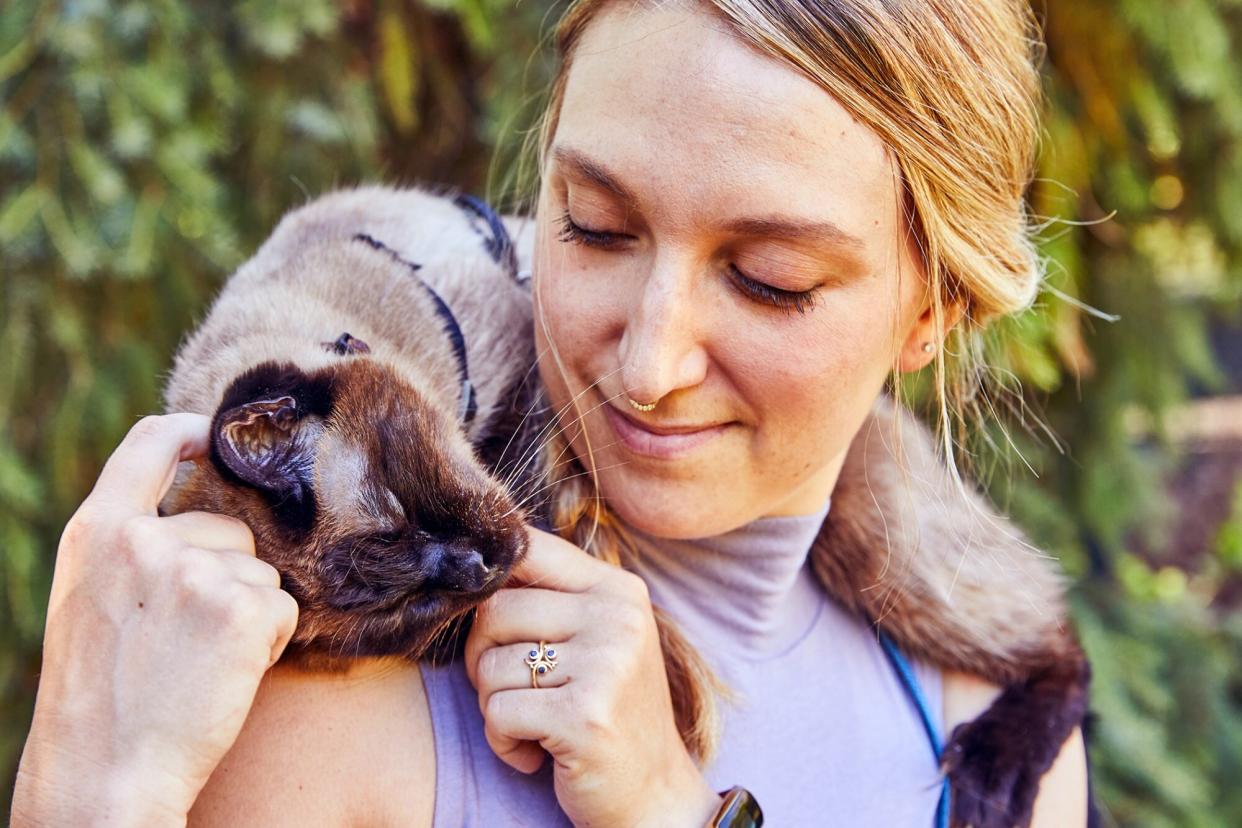Adopting a Cat Could Be Good for Your Health, Studies Suggest

Jason Donnelly
After watching a few too many TikToks with adorable kitties, you're now completely smitten and want to adopt a cat. You've got the right idea; surveys suggest they could be good for your health in many ways. However, although cats make great pets, your desire for a kitty shouldn't be based on such notions alone, according to Mary Molloy, CCPDT-KA, a feline behavior consultant at Behavior Vets NYC.
"In terms of studies, every one that I've read shows a correlation between physical and/or mental health, but I haven't seen anything showing causation," she says. "For example, I've never met anyone who got a cat for the purpose of lowering their risk of heart disease. That said, I do think there's something to be said for subjective feelings on this matter. I have no doubt that the bond between owner and cat (indeed, an owner and any beloved pet) is good for you—whether I can 'prove' it or not."
Because there aren't nearly as many health studies involving cats as there are dogs, Molloy adds that researchers often rely on owners self-reporting in surveys to gather data. So while these studies aren't necessarily scientific, there's evidence cat parents find comfort in their feline companions. Here are some reasons cats make good pets.
RELATED: New Study Suggests Cats May Be Good Pets for Children Diagnosed With Autism Spectrum Disorder
Cats Fulfill Our Social Needs
Molloy says in her experience, people who've never owned a cat and then get one are stunned to discover how loving and smart felines can be. "The stereotype is that cats are aloof, uninterested in people, unwilling to be trained, and just don't really care about humans," she adds. "There are cats like that, but time and again I meet people who were completely taken by surprise by how sweet their cats were, and how much they bonded with them."
One study sought to clarify the human-cat relationship. The conclusion was that while for some people, "cats may substitute for persons in a social network," in the majority of cases, "cats appear to be an additional source of emotional support." In fact, some breeds are considered to be among the friendliest cats, including the Burmese, Maine coon, ragdoll, and Siamese, to name a few.
Cats Can Reduce Anxiety
Some researchers, in a study published in Frontiers in Veterinary Science, discovered that cat-human interactions help "reduce measurable negative moods in the person, e.g., anxiety, depression, and introversion." Specifically, while people who might feel depressed won't initiate interaction with their cat as often, once kitty approaches them, they'll accept "the intent of the cat to interact, which affects the human's mood."
These findings also revealed that their pet changes behavior "in response to the depressiveness of the human when close to the person … vocalizing more frequently with the person and head- and flank-rubbing more often on that person." It's as if kitty knows we're sad and tries to provide additional comfort with headbutts.
RELATED: A New Study Found That Affection From Dogs Could Ease Physical Pain in Humans
Pets Keep Keep Our Minds Sharp
According to the University of Michigan, affectionate cats (okay, yes, dogs too!) help slow mental decline in older adults. Through a series of cognitive tests over a period of six years, researchers noted that longtime pet owners scored higher than those without pets.
Scientists at Washington State University also discovered that even petting a dog or cat for as little as 10 minutes resulted in a "significant reduction in cortisol, a major stress hormone."
Cats Might Reduce Risk of Heart Attack or Stroke
Additionally, a study published in the Journal of Vascular and Interventional Neurology found a link between cat ownership and a decreased risk of dying from heart attack or stroke. There's a unique possibility as to why—Molloy states there are a few studies that point to the healing power of purrs, particularly for felines and possibly for humans.
All domestic cats (and most wild cats) purr at frequencies between 20 hertz and 150 hertz. Leslie A. Lyons at the College of Veterinary Medicine at the University of Missouri noted in Orthopedics This Week that these "healing frequencies" could be one reason why for some people, " petting a purring cat has a calming effect. It decreases the symptoms of dyspnoea (difficulty in breathing) in cats and humans. It also lowers blood pressure and reduces the risk of heart disease. Cat owners have 40 percent less risk of having a heart attack."
RELATED: Why Do Cats Purr? Understanding Their Love Language
Additional Health Benefits Cats Offer
For people who can't have a cat as a pet, kitties are becoming popular therapy animals, whether offering support to hospice patients or bringing joy to residents in a senior living community. According to the Human-Animal Bond Research Institute, trained therapy cats provide as many benefits to people as interactions with therapy dogs, including reduced pain and stress, decreased symptoms of mood and behavioral conditions, and lessened reports of loneliness.
And if you simply can't foster or adopt a cat right now, that's just fine. You can still benefit from their existence through the millions of cat reels, TikToks, and other videos that populate the internet. An Indiana University study of over 7,000 people found that just watching cat-related media made individuals "more energetic … more positive" and they experienced "fewer negative emotions such as anxiety, annoyance, and sadness."

